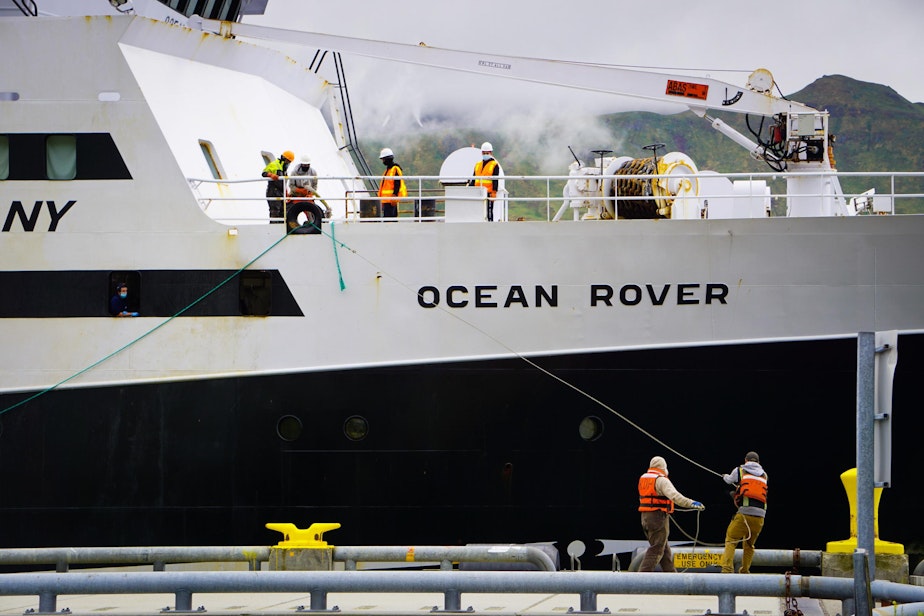Seattle fishing firm skimps on quarantine. Covid-19 outbreaks hit 110 crew members

A Seattle seafood company has had Covid-19 outbreaks on three of its six factory trawlers.
Pandemic safety measures for the fishing industry are largely voluntary in Washington state, and not all companies follow them.
Since late May, 110 crew members from three ships belonging to Seattle-based American Seafoods have fallen ill. The workers, many of them immigrants with green cards, hail from 29 states and an unknown number of countries, according to Washington Department of Health epidemiologist Marisa D’Angeli.
Her department received requests from crew members for Covid-19 information in Somali, Spanish, Sudanese Arabic, Tagalog and Vietnamese.
The workers are now in quarantine, mostly in Seattle hotels.
Their ships, the Northern Jaeger, American Triumph and American Dynasty, each about the length of a football field, are docked at Seattle’s cruise ship terminal, unable to fish without their crews.
The company hopes to get its boats and crew up to Alaska in time for the summer pollock season, which began June 10 on the Bering Sea.
Sponsored
Factories at sea
Work on board a factory trawler is hard: noisy, wet and smelly, similar to a meat packing plant, but bobbing on the ocean waves.
“Workers are side by side and across a conveyor belt from each other. So they are in very close quarters,” D’Angeli said.
When they’re not working their 16-hour shifts, crew members share cramped bunk rooms, with no room for social distancing.
“If Covid gets introduced on one of these boats, it spreads very, very easily,” D’Angeli said.
Sponsored
According to company press releases, American Seafoods tested all its workers for Covid-19 before they boarded their vessels in mid-May, and took other safety measures on board, but only quarantined its workers for five days before letting them get to work.
“They were using different protocols than the rest of the industry,” Joshua Berger, with the Washington Department of Commerce, said.
“We do recommend a 14-day quarantine with at a minimum a PCR test for Covid at the end of that quarantine period, to make sure that anyone who entered quarantine didn't come down with an infection during that time,” D’Angeli said.
After Covid-19 outbreaks on three of its ships, American Seafoods announced on June 5 that it was switching to the 14-day quarantine recommended by the state and the fishing industry.
Berger said there have been no coronavirus cases on Washington-based ships or seafood processing plants that followed the recommended protocols.
Sponsored
“Industry has done a really remarkable job at putting rigorous protocols in place,” he said.
American Seafoods spokesperson Suzanne Lagoni said she did not know how the company arrived at a five-day quarantine.
“Consulting with health authorities, the decision was made to expand to 14 days,” she said.
“We undertook extensive planning and sought the best advice to prevent Covid-19 from entering our vessels,” American Seafoods CEO Mikel Durham said in a May 30 press release announcing its first Covid-19 case.
Most Washington-based fishing companies catch their fish off Alaska, where strict quarantines and other safety measures have been imposed after discussions with the industry and local communities.
Sponsored
The Ocean Rover, an American Seafoods trawler, left Bellingham on May 29 and arrived in Alaska’s Aleutian Islands after a 16-day voyage, according to public radio station KUCB. Its 121 crew members were screened for symptoms in the port town of Unalaska, and an undisclosed number of them were tested for Covid-19.
All the tests came back negative, and the Ocean Rover is now out turning pollock into surimi and fish sticks on the Bering Sea.
No rules, just suggestions
Washington state has no plans to impose any new Covid-19 rules on its fishing industry, though the Washington state Department of Commerce is preparing to update its voluntary guidelines.
“The last thing we want to do is put guidelines in place that are not going to support our companies to go do their work in Alaska,” said Berger, Washington’s economic development director for the maritime sector.
Sponsored
I asked Berger if the workers on board these floating factories deserved rules to protect their health, not just recommendations that companies are free to ignore.
“That’s absolutely a value I share,” he said.
“But the state is not looking at imposing requirements for these workers’ safety?” I asked.
“Not at this moment,” Berger said.
In Oregon, Covid-19 outbreaks have hit seafood processing plants hard, including 124 infected workers at Pacific Seafood plants in Newport and 28 at Bornstein Seafoods in Astoria. Cases have disproportionately affected Hispanic workers, according to the Daily Astorian.
Another American Seafoods factory trawler, the Northern Eagle, is currently fishing for hake off the Oregon coast.




